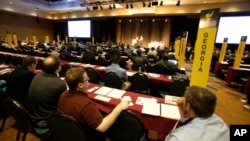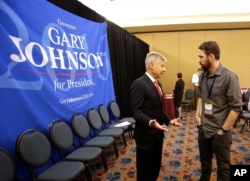A previously little-noticed U.S. political figure, Libertarian Gary Johnson, again won his party's presidential nomination Sunday, drawing new attention to his candidacy at a moment when majorities of Americans have unfavorable opinions about the major party front-runners, Republican Donald Trump and Democrat Hillary Clinton.
Recent polls show the 63-year-old Johnson, who served two terms as the Republican governor of the southwestern state of New Mexico from 1995 to 2003 before becoming a Libertarian, winning about 10 percent of the vote nationally against Trump and Clinton in a hypothetical three-way match in November's national election.
Also at the Libertarian convention in Orlando, Florida Sunday, former Massachusetts governor William Weld was chosen to run as Johnson's vice presidential candidate.
Third-party presidential candidates in the U.S. have not fared well in the quadrennial elections, often times fading when people get closer to making their decisions about whom they will vote for. If Johnson were to maintain his 10 percent level of support nationally, it is unlikely he would win any of the country's 50 states.
But his vote total could affect the outcome in some individual states, especially since more than half of Americans in recent political surveys say they view both Trump, the brash billionaire real estate mogul, and Clinton, a former U.S. secretary of state, unfavorably. U.S. presidential elections are not decided by the national popular vote, but rather in state-by-state votes, with the biggest states holding the most importance in the outcome.
Johnson's candidacy comes at a time when many Americans say they are disenchanted with the national government, a view that fueled the surge of Trump, who has never held elective office, to the top of the crowded Republican field that included a host of current and former senators and governors. Johnson would have to reach 15 percent support nationally in five polls to be included in three presidential debates scheduled for the weeks leading up to the November 8 election.
In the U.S., Libertarians favor individual rights, challenging what they say is the "cult of the omnipotent state," a view that could attract some voters to Johnson.
Johnson, as the Libertarian presidential candidate in 2012, won one percent of the vote when President Barack Obama won re-election to a second term over Republican Mitt Romney.
Libertarian adherents are holding their national convention in the southern city of Orlando, Florida, where Johnson wants the party to nominate another former Republican governor, William Weld of Massachusetts, as his vice-presidential running mate.
Ross Perot, a technology corporation executive, was the most recent serious third party presidential candidate in the U.S., winning 19 and 8 percent of the national vote, but no individual states, in the 1992 and 1996 elections, when Clinton's husband, Bill Clinton, was twice elected as president.


